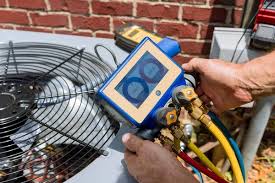Indoor air quality is a critical aspect of a healthy home environment. One often-overlooked factor that significantly impacts air quality is the maintenance of your HVAC (heating, ventilation, and air conditioning) system. Regular HVAC maintenance not only ensures the system operates efficiently but also plays a vital role in preventing dust, allergens, and pollutants from circulating in your home. Here’s why prioritizing HVAC maintenance is essential for healthier indoor air.
1. Reduction of Dust and Allergens
Over time, dust, pet dander, pollen, and other allergens can accumulate in your HVAC system. When your system runs, it can easily blow these particles back into your living space, leading to poor indoor air quality. Regular maintenance, including cleaning and replacing air filters, helps to minimize this buildup, reducing the likelihood of allergens circulating in your home.
Benefits:
- Fewer Allergens: Regular filter changes and system cleanings help reduce allergy symptoms for residents.
- Improved Breathing: A cleaner system allows for better airflow, which can enhance overall respiratory health.
2. Enhanced Filtration Performance
Most HVAC systems come equipped with filters designed to trap dust and allergens. However, if these filters are not changed regularly, their effectiveness diminishes, allowing pollutants to escape into the air. During routine maintenance, HVAC professionals will check the filters and replace them as needed, ensuring optimal performance.
Benefits:
- Effective Air Filtration: Clean filters capture more particles, improving air quality.
- Longer Lifespan of the System: Regular filter changes help prevent strain on the system, extending its operational life.
3. Mold Prevention
Humidity can build up in HVAC systems, especially in areas like ducts and drip pans. This moisture can create an ideal environment for mold growth, which can release spores into the air and trigger allergies and respiratory issues. Regular maintenance includes checking for and addressing any moisture problems, thus reducing the risk of mold development.
Benefits:
- Reduced Mold Spores: Keeping moisture in check prevents mold from spreading in your home.
- Healthier Environment: A mold-free environment supports better health for all occupants.
4. Improved Energy Efficiency
A well-maintained HVAC system operates more efficiently, using less energy to heat or cool your home. This efficiency not only lowers energy bills but also helps reduce the emissions associated with energy production, contributing to a healthier environment.
Benefits:
- Lower Energy Costs: Efficient systems consume less energy, translating to savings on utility bills.
- Less Environmental Impact: Using less energy reduces your carbon footprint, supporting overall air quality.
5. Early Detection of Issues
Regular HVAC maintenance allows professionals to identify and address potential issues before they escalate into more significant problems. For instance, a technician might discover a refrigerant leak or a malfunctioning component that could impact air quality. Early intervention can prevent these issues from affecting your indoor air.
Benefits:
- Preventive Action: Catching issues early can save money and prevent more severe problems down the line.
- Continuous Air Quality Monitoring: Regular check-ups ensure that your HVAC system maintains optimal performance.
6. Professional Cleaning and Inspection
During routine HVAC maintenance, professionals perform thorough cleaning and inspections of all components, including ducts, coils, and blowers. This deep cleaning removes accumulated dust, dirt, and allergens that regular cleaning might miss, ensuring a more comprehensive approach to air quality.
Benefits:
- Comprehensive Air Quality Improvement: A thorough cleaning enhances the overall cleanliness of the air circulated throughout your home.
- Informed Recommendations: Technicians can provide insights on additional measures you might take to improve indoor air quality.
Conclusion
Regular HVAC maintenance is a critical component of maintaining healthier indoor air quality. By reducing dust and allergens, enhancing filtration performance, preventing mold growth, improving energy efficiency, detecting issues early, and ensuring thorough cleaning, homeowners can significantly enhance the air they breathe. To protect your health and create a comfortable living environment, schedule routine HVAC maintenance with a qualified professional. Investing in your HVAC system is an investment in your home’s overall air quality and your family’s well-being.


